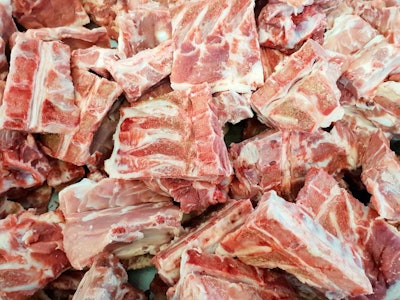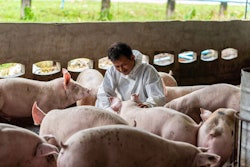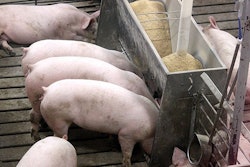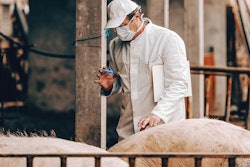
In case of an outbreak of African swine fever anywhere in the country, it is unclear whether pig and pork exports from the United Kingdom to the rest of Europe would come to an immediate halt.
In the U.K., no cases of African swine fever (ASF) have ever been detected in domestic pigs or wild boar. Surrounded by water, the island nation is protected from the transmission of the disease through the movement of wild animals. However, ASF has continued to spread in Europe — particularly in central and eastern states — since it was first detected on the continent in 2019.
Transmission of the virus — possibly as a result of human activity — remains a potential threat to the U.K. pig industry.
In case of this eventuality, the country’s industry body, the National Pig Association (NPA) is seeking clarity on whether European Union (EU) nations would accept the concept of a regionalization (compartmentalization) regarding pig meat imports from the U.K.
Since the U.K. left the EU — after the Brexit referendum and subsequent negotiations — such trade agreements have not been clarified.
“We don’t know if our trading partners would recognize regionalization if we had an outbreak now,” said Lizzie Wilson, NPA’s chief executive. “We need clarity on this because, if we don’t have regionalization, it could mean a virtual blanket ban on pork exports from anywhere in the U.K. And that would be catastrophic for a sector that has already suffered so much over the past two years.”
On this issue, the NPA is seeking clarity from the U.K. government department for the environment, food and rural affairs (Defra) and the Animal and Plant Health Agency (APHA).
According to the association, Defra reports that the two parties agreed to recognize each other’s disease-free zones at the time of the U.K.-EU Trade and Cooperation Agreement. However, Defra stated: “If ASF is detected in Great Britain, we would need to agree the process of regionalization for British exports with the EU.”
Moldova, Romania register new ASF outbreaks in domestic swine
In the past two weeks, only these two European countries have officially registered new ASF outbreaks in domestic animals.
According to notifications to the World Organisation for Animal Health (WOAH), the disease has hit 10 backyards herds in Romania. Affected were groups of up to 28 pigs in five counties across the north of the country around the end of last month.
In the neighboring state of Moldova, ASF has been detected again in two districts after a short hiatus. Reports to WOAH cover one outbreak each in the northwestern district of Falesti, and in Orhei in the center of the republic. Affected were backyard herds of two and three pigs, respectively. Source of the infection in each case is unknown.
ASF developments in Germany
To date, Germany’s total ASF cases has reached 4,749. This is according to the national veterinary agency, the Friedrich-Loeffler Institute (FLI; as of January 6). This figure includes seven outbreaks among domestic pigs, most recently in July 2022. All other cases were in wild boar, starting in September 2020.
Since January 1, FLI has confirmed 19 new ASF cases in the wild population in eastern states — 13 in Brandenburg, and six in neighboring Saxony.
To support farmers’ disease control efforts, swine industry representatives in the state of Lower Saxony have launched a publication. This contains advice to pig owners on taking appropriate biosecurity measures to protect their animals from ASF. It stresses the economic consequences of a disease outbreak, and identifies a robust fencing system as a key element for infection control.
According to Schweine from the German pig association, this barrier will not only keep the farm herd within a controlled area around the premises, but it will also exclude wild boar.
Italy confirms first wild boar infection in new province
Latest notifications from the veterinary agency in Italy to WOAH cover 26 new ASF cases among the wild boar population. Among them is a second wild boar that tested positive for ASF in Savona. This province is in the northwestern region of Liguria. Other new cases were found in Genova (also in Liguria) and Alessandria (Piedmont region).
Together with 49 outbreaks in the central Lazio region, these bring to 282 the number of confirmed ASF outbreaks in mainland Italy during 2022, based on WOAH notifications. The total includes just one outbreak among domestic pigs.
Exports of pork and live pigs can resume from the Italian island of Sardinia, according to Schweine. Since 1978, ASF had become endemic in this region. Despite efforts by the authorities over the intervening years, the infection could not be eliminated, and exports from the island were prohibited. However, from this month, movements of animals and products can resume from those parts of the island where ASF has been brought under control.
5 other European states register new cases in wild boar
Over the past two weeks, Poland’s veterinary agency has registered with WOAH a further 241 ASF cases in wild boar. Among these was the first ever case in Silesia (Slaskie). Source of the infection is unknown, but this province in the southwest of the country borders Opole — a Polish region where ASF was first detected in December 2021 — as well as the Czech Republic (Czechia) and Slovakia.
The infected animal was killed in a road traffic accident near the town of Siewierz at the end of last month, according to the chief veterinary office.
In a report dated January 4, the same agency puts the number of outbreaks in wild boar testing positive for the ASF virus in Poland in 2022 at 2,113.
Also notifying WOAH about further ASF cases in wild species have been Latvia (68 new cases), Hungary (35), Romania (17) and the Czech Republic (two).
Latest cases in the Czech Republic were confirmed on January 1. They were also found dead in the Liberec region within about 2 kilometers of the country’s first outbreak in more than four years at the end of November. The nation’s previous ASF disease wave ended in April 2018.
ASF resolved in two areas of western Russia
In recent weeks, Russia’s veterinary authority has declared to WOAH that ASF has been “resolved” in two regions.
Latest declarations cover the Republic of Tatarstan and Kursk oblast. These are located in the Volga and Central federal district, respectively. Both regions reported a small number of ASF cases in domestic swine or wild boar during October 2022.
View our continuing coverage of the global African swine fever situation.
















